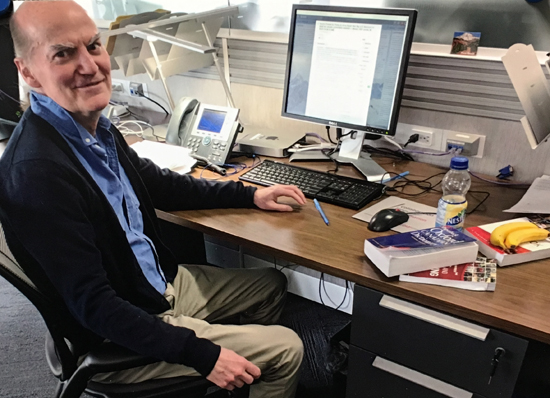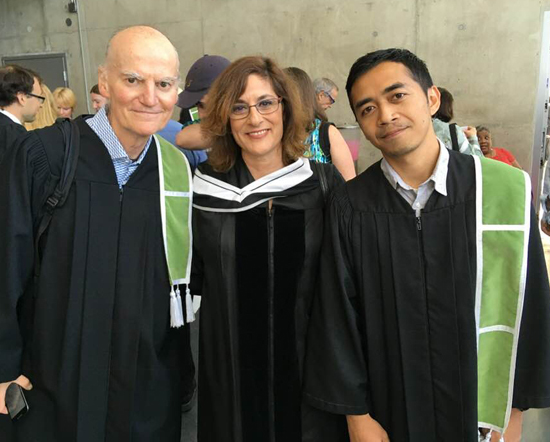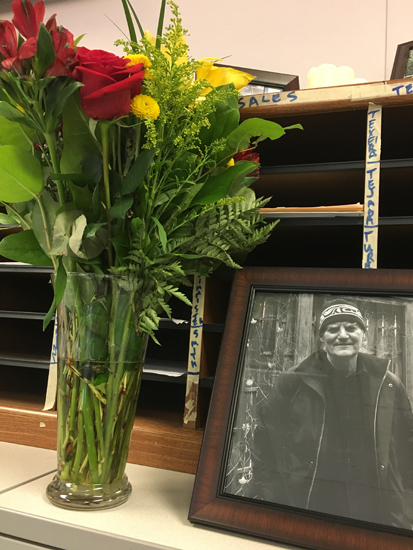
He came to my office a bit tentatively. He didn’t want to impose. It was early in the semester – back about three years ago. At the time, teaching journalism at the college where he’d enrolled, I told him it was my job to listen and offer feedback. And frankly, I told him, I welcomed the interruption. His whole face broke into a genuine smile and he settled into a chair across from me for our first conversation. Not as teacher and student, but as fellow writers.
“I know you’re an author,” he started, “and I want to write a book too. But I don’t know where to start.”
I should have asked Neil Powers, the mature student across from me in my office at Centennial College, what he wanted to write about, but I never did.
I figured that he would choose the moment to share his subject with me when it seemed appropriate. I got the feeling, however, that he was curious about writing a kind of memoir. Coming from younger journalists, I would have been sceptical – not much life experience when you’re 20 – but Powers, at about age 60, had plenty of life behind him. And, we thought, ahead of him too. Neil died earlier this month.
I felt like a parent losing a child. I cannot spell it all out here in a column – I only knew him a few years – but so as not to let his indelible impact on fellow students, instructors and friends pass without some permanence, I offer a few words from those who knew him to fill some of the gap of the memoir unwritten, that life unpublished. Among the first people Neil met in his journalism career, was Tim Doyle, the journalism co-ordinator at Centennial, to whom he had to present his credentials to enter the program.
“He said he was a bit older than the other students,” Tim said. “He wondered if he should move from Seattle to take the course? Could he fit in? … And when I hadn’t gotten back to him, like every good journalist, he went to my boss’s, boss’s boss to get the answer. So, I called him and said, ‘First off, you’re in. You have what it takes to be a journalist.’”
Neil Powers clearly had what it takes for more than journalism. Born in Scranton, Pennsylvania, in 1955, he got his first job offering outreach assistance to homeless youth on a university campus in the Seattle area. He took his sense of activism to city hall in 1997, when Seattle Councillor Peter Steinbrueck hired Neil as his legislative assistant.
Neil seemed to focus on land use policy, affordable housing and homelessness. A friend and advocate, John Fox, told the Seattle Gay News, “When voicing our concerns on policy, it was Neil we would first talk to in order to influence (Councillor) Steinbrueck.”
His colleagues at Seattle City Hall and later the city’s United Way campaign recalled that Neil was “notoriously gracious, thoughtful, polite with all those he interacted with,” and despite never learning to drive, was punctual, arriving where he worked even before offices were unlocked for the day. He exhibited the same keenness in 2016 when he left Seattle for Centennial’s journalism program.

I considered myself pretty punctual starting my Copy Editing lectures on campus, but Neil always beat me to class. He said copy editing was like elementary school, learning something new about words every session. We shared that passion for writing and advocacy too. John Fox noted Neil’s concern about inequality, the rights of indigenous peoples, and as a gay man himself, he worked tirelessly with LGBTQ activists in Toronto.
As driven as Neil appeared, he valued friendships more than anything, always putting others before himself. Last year, when faculty members at the college were on strike – despite the apparent rift the strike created between instructors and students at the school – Neil regularly visited the picket lines to deliver sweets, claiming the faculty might need an occasional sugar fix to get through the day.

Last winter, when a placement position at CBC became available to graduating students, Neil earned an early interview, but as soon as he’d completed the gruelling interrogation, he shared the questions he’d endured with a fellow student in competition for the same position. Recalled his competitor: “I remember the day we got the call to learn that I had gotten the job and he hadn’t. You could see the happiness on his face. He was totally selfless.”
Neil Power’s independent way of thinking, of living, of putting others first, may have contributed to his death. Early this month, friends learned that his chronic laryngitis had sparked shortness of breath, weakness, and a sudden loss of weight. Not wishing to be a burden, he downplayed the severity of his condition, and was suddenly gone.
His memoir, though not captured in print, is written in his deeds for others.
There will be a memorial service in Toronto for Neil which starts at 2:00 pm on Saturday, Sep. 29th
at Eastminster United Church, 310 Danforth Ave., Toronto.
There is also a “Neil Powers Memorial” group on Facebook where people can share their memories of Neil, their stories, photos and comments. Here is a link:
https://www.facebook.com/groups/336962466874791/
Mr. Barris, Neil did learn to drive. In college we bought a 1967 Chrysler Newport. He drove it
a good bit of the way across Pennsylvania to visit his parents with me. After
that trip, he decided he would rather use public transit. My son is named after him. Warm regards, Joe Crowley – Pittsburgh, PA, USA
Thank you, a wonderful reflection. Neil has been front and center in my heart and mind for days now. He would perhaps smile about that but never make anything of it. There was an incredibly deep shyness in him as well a restless wandering through life. I’ve been incredibly grateful that the various obits show the persona he nurtured was his unusual kindness and care. That side was barely visible in his earlier years. But a steady core was his commitment to justice and disadvantaged people. In the 40 years I knew him he grew from a somewhat hesitant man into a giant spreading love wherever he went. A wonderful way to end his life, short as it was in years though endless in grace.